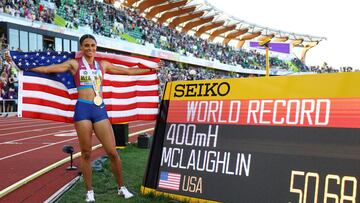What’s next for record-breaking Sydney McLaughlin?
The 400m hurdles specialist, who broke her own world record in Eugene, is considering switching to the flat 400m or even doubling up in future.

After breaking the 400 metres hurdles world record and becoming the first woman to run under 51 seconds in the event, Sydney McLaughlin is already looking for her next challenge and is considering a switch to the 400m flat race or even doubling up.
The American Olympic champion clocked 50.68 to win gold at World Championships on Friday, taking a massive .73 seconds chunk out of her previous world record.
The 22-year-old told reporters shortly after the race she and her coach Bobby Kersee, who has worked with seven-times Olympic gold medallist Allyson Felix, had been thinking about taking on another event even before arriving in Eugene, Oregon. The world record holder already runs 4x400m relay and could feature in the event at the World Championships.
WORLD RECORD.
— Team USA (@TeamUSA) July 23, 2022
WORLD CHAMPION.
SYDNEY MCLAUGHLIN.
🤯 pic.twitter.com/5XI8yg3WcZ
McLaughlin: “There’s talk of doubles, of switching”
“Bobby’s always coming up with new ideas so it’s hard to pin down one, but there’s talks of doubles, there’s talks of switching, so honestly I have no clue,” she said.
“I haven’t even talked to him after the race so that’s something we’ll go back home after the season, discuss, see what we want to do and if it makes sense, it makes sense.”
The USATF confirmed to Reuters she is considering the 400 metres. Femke Bol, who beat Dalilah Muhammad to silver, hopes McLaughlin stays with the hurdles.
“She pushes me to also go faster and try harder and I think it’s amazing to run in a race like today,” said Bol. “I just love competing against the best.”
Related stories
But while other events could prove tempting, McLaughlin said there was room to improve over the hurdles, telling reporters that even Friday’s stunning race was not “super clean”.
“I think there’s still more to go,” she said. “I think we’re all figuring out that, yes there’s 10 barriers but we can run them a lot faster than people think.”

